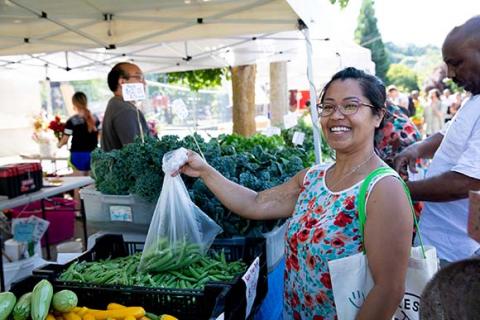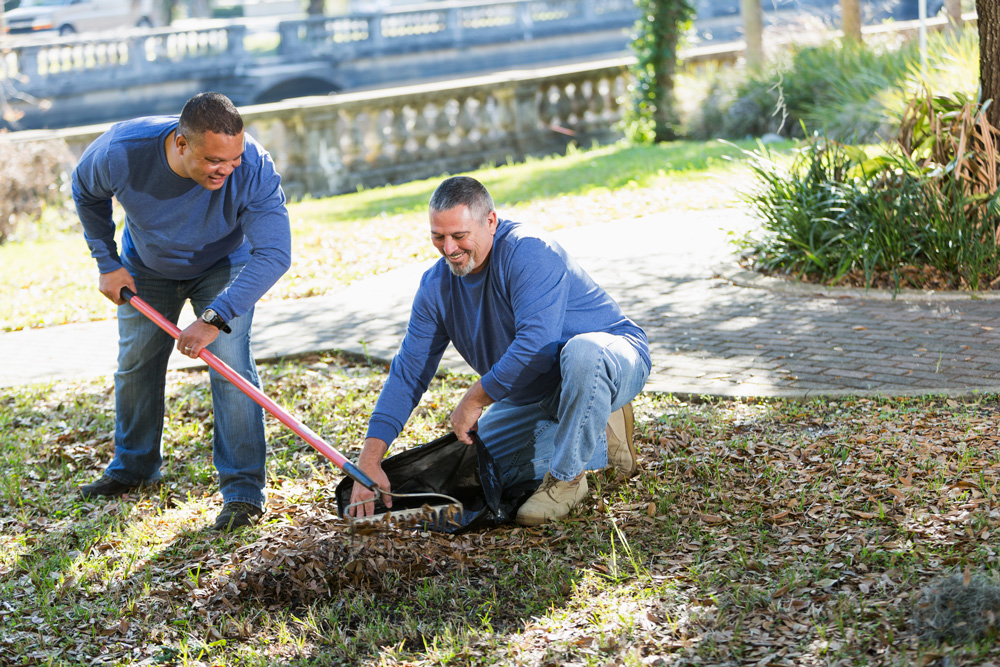
Photo by Naomi Ishisaka, on behalf of the City of Seattle.
Each year, the Northwest Public Health Training Center funds student public health projects. Meagan Brown, a recipient of funding during the 2017–18 school year, describes her evaluation project on food insecurity with the Odessa Brown Children’s Clinic.
In 2016, Seattle’s Odessa Brown Children’s Clinic (OBCC) was one of a number of clinics around the state to launch a produce prescription program. OBCC's involvement came in response to a 2011 clinic survey which found 57 percent of their families did not have access to or were not able to afford nutritious food. The City of Seattle program, called Fresh Bucks Rx, provides low-income, food insecure families with prescription vouchers to purchase fresh fruits and vegetables at either Safeway or local farmers markets. OBCC is the only family-focused clinic participating in the program.
To help OBCC gain insight on the efficacy of the Fresh Bucks Rx program, Meagan Brown, a PhD graduate student from the University of Washington’s Department of Health Services, worked with the clinic and another graduate student to evaluate the program. Brown, who received funding for her project through NWCPHP’s Northwest Public Health Training Center, worked with the team to collect and analyze in-depth data about the program’s impact on the participants’ budget, food purchases, eating behavior, and health, by conducting a series of phone surveys and focus groups.
“The primary goal of the project was to collect data on the participants’ experiences redeeming the vouchers and the perceived impact of the prescriptions on their family,” said Brown. “We also were interested in identifying recommendations for program improvement and expansion.”
Overall, focus group and phone survey participants were very enthusiastic about the Rx voucher program, with many reporting that the additional money for fruits and vegetables allowed them to purchase fresh produce they could not otherwise afford.
“Parents also told us they used the prescriptions as an opportunity to buy new fruits and vegetables they and their children had never tried before,” said Brown. “Even though the initial program only lasted for six months per household, participants described the positive impacts they felt the program had on their families’ health.”
One participant described that through a combination of healthier eating through the Fresh Bucks Rx program and participation in a physical activity program led by the YMCA, her daughter was able to successfully return a normal blood glucose level after being diagnosed as pre-diabetic.
In addition to the positive program impacts on families, participants also had a number of recommendations to improve the program. Some of these suggestions focused on making the Fresh Bucks Rx vouchers easier to redeem, such as proper training of Safeway cashiers and developing a clear understanding of what a proper transaction involving a Rx voucher looks like. Many participants also requested additional housing resources, as housing insecurity is a growing concern and an upstream cause of their food insecurity status. Other suggestions for additional programming included cooking classes offered at OBCC or within the community, a community garden, expansion into school-based clinics, and an informational flyer on proper storage of fresh fruits and vegetables.
For Brown, some of the most valuable parts of the project included working with a community-based organization and using her qualitative research skills to gather important information for an ongoing and evolving program. During the course of the study, Fresh Bucks Rx vouchers expanded to other local grocery stores and OBCC learned they were receiving additional funds to expand and lengthen enrollment, causing them to tailor their listening session questions accordingly. Brown says the project also afforded her the unique opportunity to co-mentor a student on conducting and analyzing qualitative research, which she appreciated since she is interested in a future career in academia.
“Listening to participants tell us how much of an impact this program had on them and their family was incredibly inspiring and reminded me of why I am excited to be engaged in community-based health promotion research,” said Brown. “I am incredibly grateful for this opportunity to work on such an exciting project with other people who are passionate about addressing food insecurity in Seattle.”
Moving forward, Brown will be working with the clinic to analyze program impacts on household food insecurity status and child health, using health record data. She also plans to work more closely with OBCC after graduation on developing strategies to improve Rx voucher redemption rates.
Visit the Northwest Public Health Training Center for more information about student funding.
The Northwest Public Health Training Center is housed within the Northwest Center for Public Health Practice at the University of Washington School of Public Health. It is one of ten regional Public Health Training Centers funded by the Health Resources and Services Administration.


